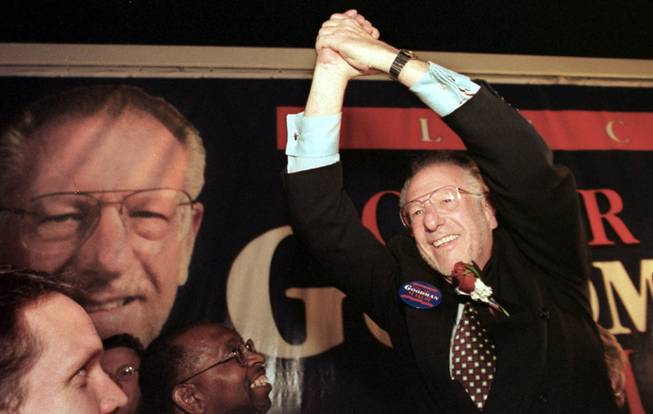
Steve Marcus / FILE PHOTO
Oscar Goodman raises his arms in victory on June 8, 1999, after winning the Las Vegas mayoral race. Goodman has been reelected twice, and, unless term limits are overturned, will be unable to run for a fourth term. The limit for mayors is three four-year terms.
Friday, March 7, 2008 | 2 a.m.
Beyond the Sun
A group of prominent Nevada Democratic officeholders, including Mayor Oscar Goodman and Assembly Speaker Barbara Buckley, met recently to discuss a legal challenge to the voter-approved constitutional amendment imposing term limits on local and state officeholders.
Harry Reid, the U.S. Senate majority leader from Nevada, organized the recent meeting at the law offices of Lionel Sawyer & Collins, the firm of Reid’s son, Clark County Commission Chairman Rory Reid.
The meeting also included Henderson Mayor Jim Gibson, state Senate Minority Leader Dina Titus, state party officials and representatives of a Washington law firm. Several participants confirmed that the meeting occurred.
Key legislators, including Buckley and 18 others, are scheduled to be ousted in 2010 by term limits approved more than a decade ago, and Titus and six others will be forced to leave in 2012, according to a report by the Nevada Association of Counties. Goodman and Gibson are both in their final mayoral terms.
Voters approved a term limit amendment in 1994 and passed it a second time, as required by the state Constitution, in 1996. It limits members of the Assembly to six two-year terms and senators to three four-year terms. Mayors are limited to three four-year terms. (A constitutional amendment passed in 1970 limits governors to two four-year terms.)
The meeting of Democratic officials was informal and the discussions preliminary, according to a source with knowledge of the conversations.
None of the meeting’s participants would comment to the Sun about the discussions, an indication of the politically sensitive nature of the subject. Participants could be portrayed by political and ideological foes as defying the will of Nevada voters by trying to retain their positions of power.
Republicans are also interested in overturning term limits.
Lobbyists said interest groups including mining, gaming, labor, real estate and retail, all of which have ties to a party and to long-serving legislators, are interested in a legal challenge, but want no direct association.
Harry Reid has his own motivations in the matter. Although not covered by the law, his interest is clear as the state’s most powerful Democrat: Perpetuating the status quo keeps the state’s most effective Democrats in office. That in turn maintains the health of the party while preventing term-limited Democrats from considering a run for a different office — such as, say, U.S. senator or governor or Clark County commissioner. Rory Reid, the current chairman of the commission, is often mentioned as a prospective candidate for governor. He was not at the meeting.
The term limits movement swept across the country, and especially the West, beginning in the early ’90s. Conservative populists led the movement, which expressed outrage at long-serving incumbents and reelection rates that often approached 100 percent. Term limits were a plank of the Republicans’ 1994 Contract with America, though the party mostly lost interest in the cause after taking control of Congress and many state legislatures.
Opponents of the limits across the United States often argue that citizens need experienced lawmakers to counterbalance the influence of lobbyists and the persistent power of government bureaucracy. In Nevada, where part-time legislators convene just once every two years in Carson City, the limits would undoubtedly result in greater clout for lobbyists, who could use their information and knowledge of the legislative process to manipulate lawmakers.
Harry Reid mentioned that influence in explaining his opposition. “Sen. Reid has long been concerned about the impact term limits will have on the increased power of special interests in Nevada,” said Jon Summers, Reid’s spokesman.
Interviews with other elected officials showed that as incumbent doomsday approaches, term limits are becoming a frequent topic of private conversations.
Many questions about a legal challenge are still outstanding, such as whether an independent group representing voters can challenge the term limits, or whether a politician will have to do so and risk being seen as trying to undercut the will of voters.
One Republican lawmaker said it would be best if groups with disparate political views came together to challenge the law.
“If a politician did it for themselves, it would be seen as self-serving,” the Republican legislator said.
Any legal challenge would likely hinge on the process by which the amendment passed in 1996.
The 1994 question before voters, which passed with 70 percent of the votes, limited the terms of elected officeholders, including judges. The Nevada Supreme Court then split the amendment into a Part B, which covered judges, and a Part A, which covered everyone else, according to a history of the amendment published by the Nevada Association of Counties.
Part A passed. Part B failed.
Term limit opponents could argue that the amendment approved in 1996 was different from the one passed in 1994, which could legally invalidate the amendment.

Join the Discussion:
Check this out for a full explanation of our conversion to the LiveFyre commenting system and instructions on how to sign up for an account.
Full comments policy